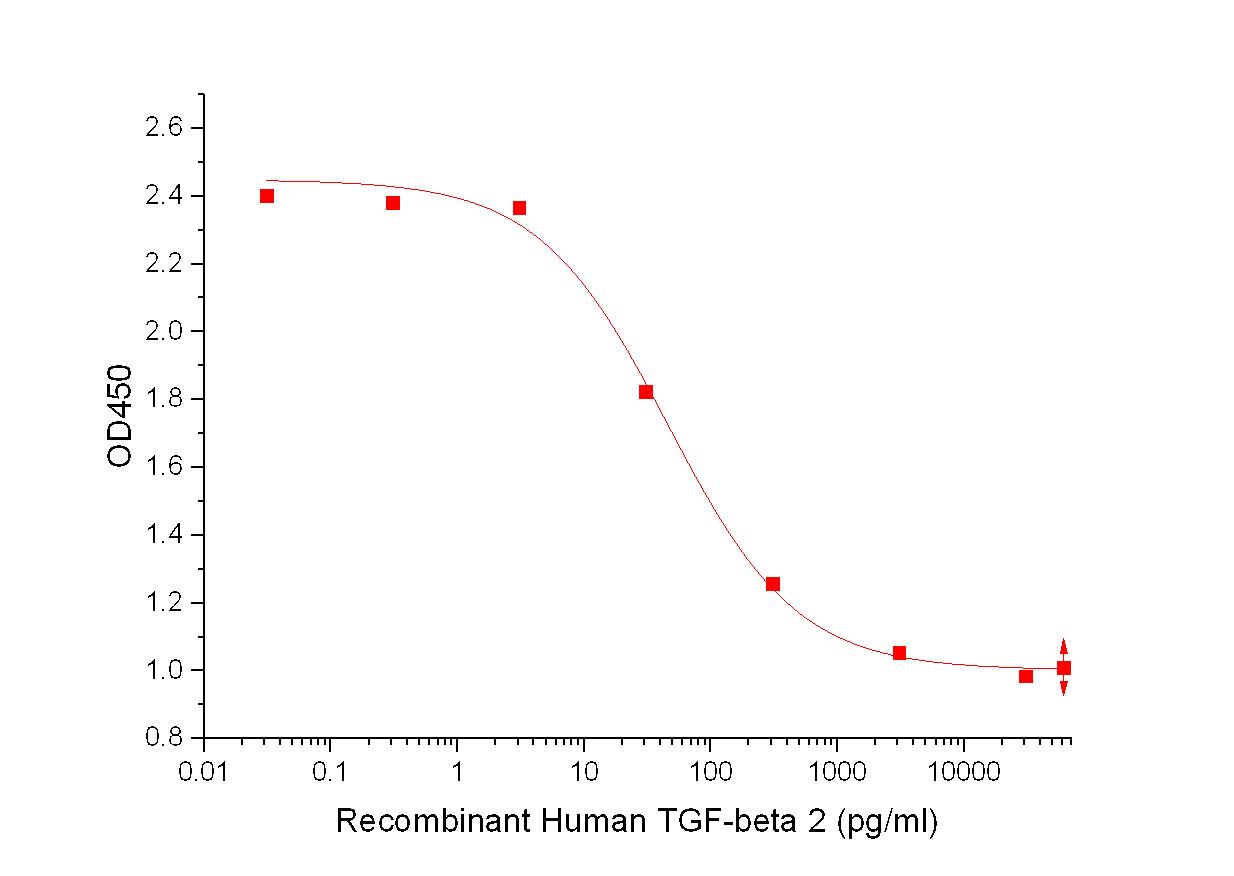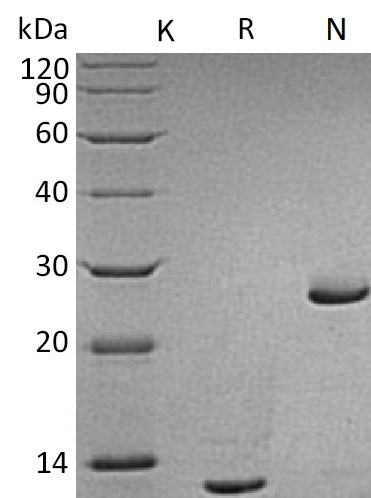Shopping Cart
Remove All Your shopping cart is currently empty
Your shopping cart is currently empty
Transforming growth factor beta-2 (TGF-β2) is a secreted protein which belongs to the TGF-beta family. It is known as a cytokine that performs many cellular functions and has a vital role during embryonic development. The precursor is cleaved into mature TGF-beta-2 and LAP, which remains non-covalently linked to mature TGF-beta-2 rendering it inactive. It is an extracellular glycosylated protein. It is known to suppress the effects of interleukin dependent T-cell tumors. Defects in TGFB2 may be a cause of non-syndromic aortic disease (NSAD).

| Pack Size | Price | USA Warehouse | Global Warehouse | Quantity |
|---|---|---|---|---|
| 5 μg | $74 | 7-10 days | 7-10 days | |
| 10 μg | $118 | In Stock | In Stock | |
| 20 μg | $187 | 7-10 days | 7-10 days | |
| 50 μg | $350 | 7-10 days | 7-10 days | |
| 100 μg | $618 | 7-10 days | 7-10 days | |
| 200 μg | $1,090 | 7-10 days | 7-10 days | |
| 500 μg | $2,360 | 7-10 days | 7-10 days | |
| 1 mg | $3,790 | 7-10 days | 7-10 days |
| Biological Activity | Measured by its ability to inhibit the IL-4-dependent proliferation of TF-1 cells. The ED50 for this effect is 30-180pg/ml. (QC verified)  |
| Description | Transforming growth factor beta-2 (TGF-β2) is a secreted protein which belongs to the TGF-beta family. It is known as a cytokine that performs many cellular functions and has a vital role during embryonic development. The precursor is cleaved into mature TGF-beta-2 and LAP, which remains non-covalently linked to mature TGF-beta-2 rendering it inactive. It is an extracellular glycosylated protein. It is known to suppress the effects of interleukin dependent T-cell tumors. Defects in TGFB2 may be a cause of non-syndromic aortic disease (NSAD). |
| Species | Human |
| Expression System | HEK293 Cells |
| Tag | Tag Free |
| Accession Number | P61812 |
| Synonyms | Transforming growth factor β-2,Transforming growth factor beta-2,TGF-β-2,TGF-β2,TGF-beta-2,TGFB2,Polyergin,G-TSF,Glioblastoma-derived T-cell suppressor factor,Cetermin,BSC-1 cell growth inhibitor |
| Amino Acid | Ala303-Ser414 |
| Construction | Ala303-Ser414 |
| Protein Purity | Greater than 95% as determined by reducing SDS-PAGE. (QC verified)  |
| Molecular Weight | 12 KDa (reducing condition) |
| Endotoxin | < 0.001 ng/µg (0.01 EU/µg) as determined by LAL test. |
| Formulation | Lyophilized from a solution filtered through a 0.22 μm filter, containing 4 mM HCl. |
| Reconstitution | Reconstitute the lyophilized protein in distilled water. The product concentration should not be less than 100 μg/ml. Before opening, centrifuge the tube to collect powder at the bottom. After adding the reconstitution buffer, avoid vortexing or pipetting for mixing. |
| Stability & Storage | Lyophilized powders can be stably stored for over 12 months, while liquid products can be stored for 6-12 months at -80°C. For reconstituted protein solutions, the solution can be stored at -20°C to -80°C for at least 3 months. Please avoid multiple freeze-thaw cycles and store products in aliquots. |
| Shipping | In general, Lyophilized powders are shipping with blue ice. Solutions are shipping with dry ice. |
| Research Background | Transforming growth factor beta-2 (TGF-β2) is a secreted protein which belongs to the TGF-beta family. It is known as a cytokine that performs many cellular functions and has a vital role during embryonic development. The precursor is cleaved into mature TGF-beta-2 and LAP, which remains non-covalently linked to mature TGF-beta-2 rendering it inactive. It is an extracellular glycosylated protein. It is known to suppress the effects of interleukin dependent T-cell tumors. Defects in TGFB2 may be a cause of non-syndromic aortic disease (NSAD). |
| Size | Quantity | Unit Price | Amount | Operation |
|---|

Copyright © 2015-2026 TargetMol Chemicals Inc. All Rights Reserved.